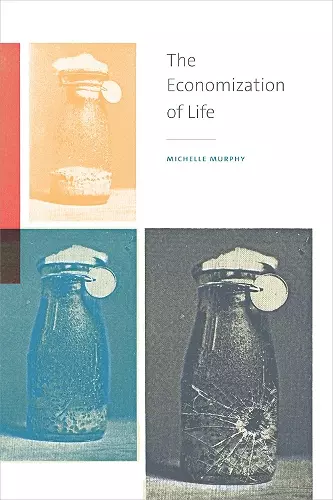The Economization of Life
Format:Hardback
Publisher:Duke University Press
Published:12th May '17
Currently unavailable, and unfortunately no date known when it will be back
This hardback is available in another edition too:
- Paperback£20.99(9780822363453)

What is a life worth? In the wake of eugenics, new quantitative racist practices that valued life for the sake of economic futures flourished. In The Economization of Life, M. Murphy provocatively describes the twentieth-century rise of infrastructures of calculation and experiment aimed at governing population for the sake of national economy, pinpointing the spread of a potent biopolitical logic: some must not be born so that others might live more prosperously. Resituating the history of postcolonial neoliberal technique in expert circuits between the United States and Bangladesh, Murphy traces the methods and imaginaries through which family planning calculated lives not worth living, lives not worth saving, and lives not worth being born. The resulting archive of thick data transmuted into financialized “Invest in a Girl” campaigns that reframed survival as a question of human capital. The book challenges readers to reject the economy as our collective container and to refuse population as a term of reproductive justice.
"Though this book be concise, it is fierce. It can be read, and reread, with profit by undergraduates, graduate students, and researchers. Highly recommended." -- T. E. Sullivan * Choice *
"The Economization of Life convincingly links experimentality to what has been one of the most popular developmental trends of the past two decades. . . . M. Murphy’s bold and sharp book opens many new lines of inquiries." -- Stephen Macekura * Diplomatic History *
"This is a valuable book that should be read by anyone who is interested in the mid-twentieth-century population control movement, including its history and socioeconomic context, or anyone who still adheres to the neoliberal view that population growth (or 'overpopulation,' as it is often called) has been and continues to be one of the greatest problems facing human society." -- Garland E. Allen * Isis *
"Murphy weaves helpful threads of history, literature, and economics, guides the reader through complicated ideas, and leaves enough notes so research can continue beyond the book’s borders. . . . The Economization of Life is a useful and an instructive tool for policy makers and researchers on population and reproductive health, and for scholars and students in gender, women, and sexuality studies, or anyone who may be concerned with matters of reproductive rights." -- Kira Frank * Wagadu *
"It takes a study as rigorous as Murphy’s to expose the double-edged nature of human capital: galvanizing self-improvement of, and popular support for, underprivileged populations, even as it does so according to metrics that have investor interests—rather than general well-being—as their goal." -- Hadas Weiss * Public Books *
"The Economization of Life is a book that sticks. Author M. Murphy delicately surfaces the history and persistence of racist and eugenicist logics as they comprise global economies and state governance practices, and, in a bold and self-reflexive gesture, describes how these same logics operate in feminist organizations and academic research. Murphy's work forced me to grapple with unresolvable tensions, particularly between long term liberation and short term survival, which were simultaneously troubling and eye-opening. I can see these now in places where they used to be hidden." -- Lourdes Vera * Somatosphere *
"The Economization of Life gives us important tools to bring the work of reproductive justice from the world of feminist social justice organizing to the world of feminist scholarship. It shows us that the economy is an effect that materializes its own causes, supported by a structure of belief that holds together otherwise disparate data and calculations. With enough effort, it urges us, we should be able to divest from that enabling belief, and instead follow models for a regenerative politics, committing instead to reproductive justice as an infrastructure of regeneration." -- Kalindi Vora * Somatosphere *
ISBN: 9780822363347
Dimensions: unknown
Weight: 454g
232 pages